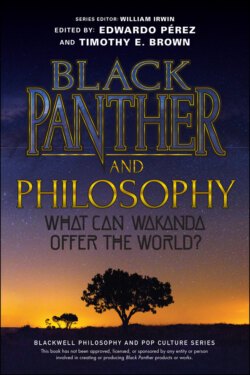Читать книгу Black Panther and Philosophy - Группа авторов - Страница 10
1 Challenge Day Tradition and Revolution in Wakanda
ОглавлениеArmond Boudreaux
At its heart, Wakanda has a paradoxical nature: in its integration of technology into daily life, the reclusive nation is more like the industrialized countries of the Western world than its continental neighbors, but in its political structure, it has more in common with the ancient African past. Wakanda uses highly advanced science to improve the lives of its people, and yet it is ruled by kings who are selected through inheritance and ritual combat. In other words, it is a nation of contradictions, ruled by a complex synthesis of reason and tradition.
Moreover, Wakanda controls the Vibranium Mound, which is perhaps the most important resource on earth, a resource that has defined Wakandan society for millennia. Situated inside a mountain, the Vibranium Mound is what remains of a meteor that fell to Earth in the deep past. Though small amounts of vibranium have left Wakanda over the years (showing up in Captain America’s shield, US Agent’s shield, and in Ulysses Klaue’s sonic cannon, for example), the unearthly metal remains the property of Wakanda – and therefore the responsibility of its king.
The paradoxes at the heart of Wakandan society as well as its highly desirable resources mean that it is often the subject of attacks, invasions by outsiders, and attempted political revolutions. Many people have challenged its ancient traditions and political order, claiming to offer a better use of its resources or a more just society than the culture that has evolved organically over the course of millennia (as if it isn’t absolutely crazy to try to take over the Black Panther’s home turf!).
It seems as if every supervillain and misguided revolutionary thinks that he or she knows better than T’Challa how to run Wakanda. We see this, for example, when Eric Killmonger and Baron Macabre try to stage a coup in Jungle Action #17, when Achebe takes over Wakanda early in Christopher Priest’s run on the Black Panther book, when a radical group called The People tries to overthrow T’Challa’s rule in Ta Nehisi Coates’s run, and most recently in the Black Panther movie when Killmonger briefly takes over Wakanda in the name of combatting racism and injustice. Though each of these attempts at revolution is fueled by different motivations and values, each proves to be fruitless and costly – both to the revolutionaries and to the people they think they’re saving.
It might be tempting to say that Wakanda just hasn’t seen the “right” kind of revolution yet. Maybe all these revolutions fail because the revolutionaries are corrupt. Maybe their motives are not pure enough. Or maybe their plans simply haven’t been “smart” enough yet. Maybe what Wakanda needs is more moral and more intelligent revolutionaries. It might also be tempting to say that the Wakandan monarchy is simply strong enough to withstand revolutions, that might can overcome right. But there’s more at work in the preservation of Wakanda’s social order than the incompetence and corruption of the revolutionaries or the strength of Wakanda’s rulers in maintaining the status quo.
In fact, the repeated failed attempts at coup and revolution in Wakanda show two important things about political and social change. First, they show that pure reason divorced from tradition and custom cannot provide the social cohesion that is necessary for nations to exist. Second, they show that revolutions often destroy the thing that they seek to preserve – even (and perhaps especially) when they succeed in reinventing societies to fit the ideology of revolutionaries. Nations have to be able to reform and to respond to changing circumstances, but as the British statesman Edmund Burke (1729–1797) argued in a very different time and place than present-day Wakanda, true revolution poisons society rather than saves it.
